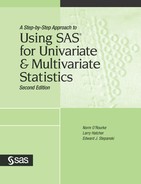Introduction: A Common Language for Researchers
Research in the social sciences is a diverse topic. In part, this is because the social sciences represent a wide variety of disciplines, including (but not limited to) psychology, sociology, political science, anthropology, communication, education, management, and economics. A further complicating matter is the fact that, within each discipline, researchers can use a number of very different quantitative methods to conduct research. These methods can include unobtrusive observation, participant observation, case studies, interviews, focus groups, surveys, ex post facto studies, laboratory experiments, and field experiments to name but a few.
Despite this diversity in methods and topics investigated, most social science research still shares a number of common characteristics. Regardless of field, most research involves an investigator gathering data and performing analyses to determine what the data mean. In addition, most social scientists use a common language when conducting and reporting their research findings. For instance, researchers in both psychology and management speak of “testing null hypotheses” and “obtaining statistically significant p values.”
The purpose of this chapter is to review some of the fundamental concepts and terms that are shared across social science disciplines. You should familiarize (or refamiliarize) yourself with this material before proceeding to the subsequent chapters, as most of the terms introduced here are referred to repeatedly throughout the text. If you are currently taking your first course in statistics, this chapter provides an elementary introduction; if you have already completed a course in statistics, it provides a quick review.
